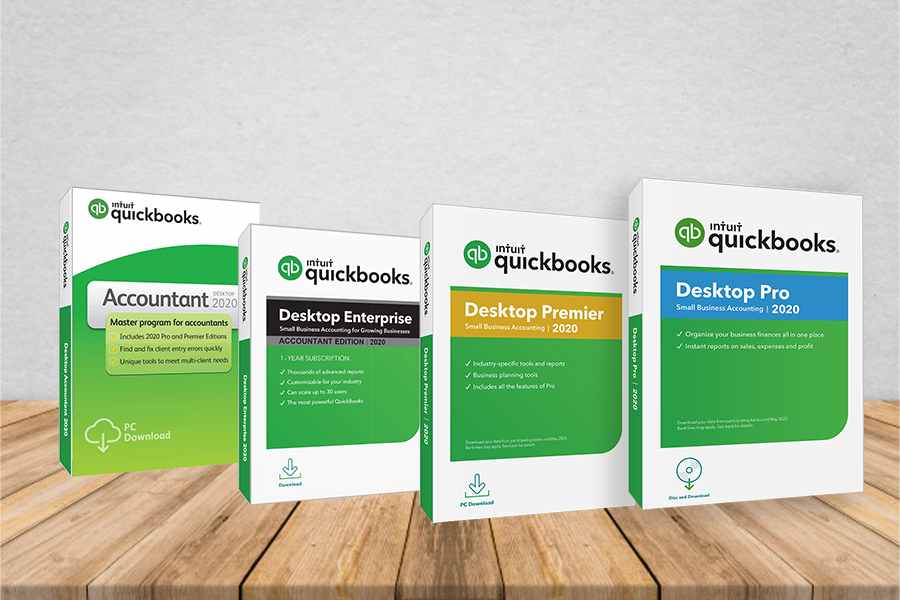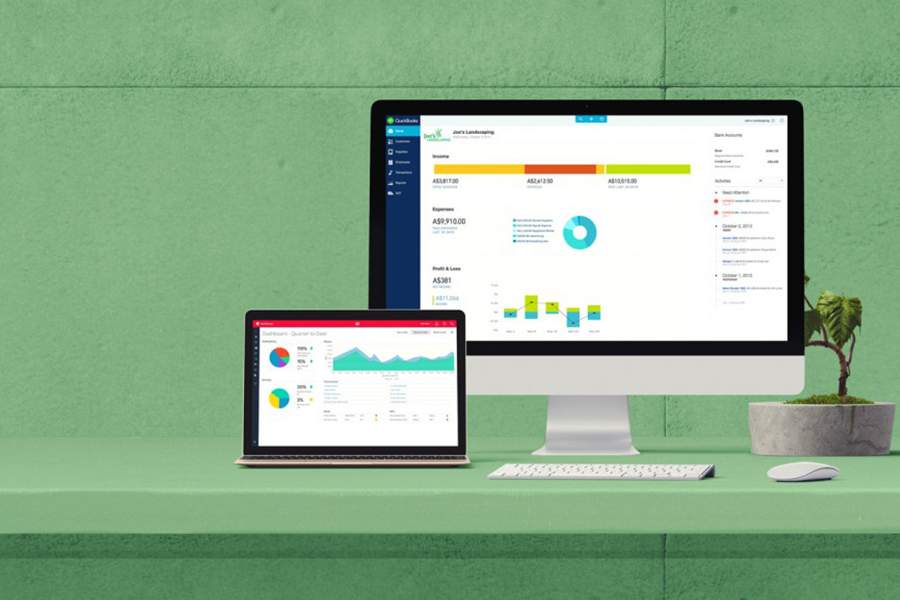QuickBooks Desktop Enterprise, also called QuickBooks Enterprise, is a desktop-based accounting software that offers advanced tools for managing complicated pricing and inventory tracking. We find it a great choice for midsize and large businesses—especially those with large inventories—but it’s too expensive and complex for small businesses.
It contains all of the features of Pro and Premier, the other QuickBooks Desktop accounting products that will be discontinued for new users after July 31, 2024. Existing Pro and Premier users can still renew their subscriptions, but the only option available for new users is QuickBooks Enterprise. Learn if it’s right for you in our comprehensive QuickBooks Enterprise review.
The Fit Small Business editorial policy is rooted in the company’s mission, which is to deliver the best answers to people’s questions. This serves as the foundation for all content, demonstrating a clear dedication to providing valuable and reliable information. Our team leverages its expertise and extensive research capabilities to identify and address the specific questions our audience has—and this ensures that our content is rooted in knowledge and accuracy.
In addition, we employ a comprehensive editorial process that involves expert writers. This process ensures that articles are well-researched and organized, offering in-depth insights and recommendations. Fit Small Business maintains stringent parameters for determining the “best” answers, including accuracy, clarity, authority, objectivity, and accessibility, and these see to it that our content is trustworthy, easy to understand, and unbiased.

Pros
- Advanced inventory tools, like bin and location tracking and barcode scanning
- Fixed asset management
- Consolidate financial statements from multiple companies
- Create custom pricing rules
- VIP customer support
Cons
- Desktop program requires installation and setup
- More expensive plan needed for QuickBooks cloud hosting
- Too expensive and complex for small businesses
- Limited mobile accounting app (only for receipt capture and mileage tracking)
Pricing |
|
|---|---|
Discount | ✕ |
Free Trial | ✕ |
Money-back Guarantee | 60 days |
Standout Features |
|
Ease of File Sharing | Requires you to make an Accountant’s copy to share with your accountant (acceptable but not as convenient as file sharing in QuickBooks Online, where you only need to send an invitation email to your accountant) |
Ease of Use | Should be easy to use if you’re upgrading from Pro or Premier, but not as intuitive as a cloud-based program |
Customer Support | Unlimited customer support through QuickBooks Priority Circle, community forums, live chat, chatbot, and self-help guides |
- Midsize and large businesses: QuickBooks Enterprise supports up to 40 users and can track up to 1 million items, employees, customers, and vendors.
- Companies needing advanced inventory management: You can track inventory by location and bin. QuickBooks Enterprise also lets you generate customized barcodes to track an item.
- Businesses with a large volume of invoices: Its batch invoicing feature lets you send out multiple invoices at once with one click.
- Companies managing fixed assets: It has a built-in Fixed Asset Manager that serves as your hub in managing fixed asset information, depreciation methods, groupings, and basis.
- Businesses with multiple entities: One license allows the accounting for unlimited entities, and QuickBooks Enterprise 24.0 allows you to consolidate financial statements from multiple companies.
QuickBooks Enterprise Alternatives
| Users Like | Users Dislike |
|---|---|
| Manage multiple companies | Expensive for small businesses |
| Advanced reporting features | Unresponsive customer support |
| Easily connects to bank accounts | |
Below, we share the most relevant user reviews plus my expert insights:
- One user who left a positive QuickBooks Enterprise review appreciates that it can manage multiple companies in a single account. With other software like QuickBooks Online, you have to pay a separate subscription fee for each company. Also, I like that Enterprise can combine reports from multiple companies.
- Some are impressed with its reporting features, thanks to its advanced reporting module that allows you to build highly customized reports based on your needs.
- Many reviewers said that they like that it easily connects to bank accounts to import statements. If you’re uncomfortable connecting your banks, you can also import transaction files manually.
- One user complained that it’s a bit expensive for small businesses. I agree with this, so if you don’t require the advanced features of Enterprise, I recommend choosing from our list of the best small business accounting software instead.
- A reviewer expressed that they dislike that its customer support team is a bit slow. From my experience, the quality of support varies depending on the customer support representative assigned to you. However, I dislike that they would often transfer me from one agent to another before I get a correct answer—or sometimes get no useful answer at all.
As of this writing, here’s how QuickBooks Enterprise is rated by third-party sites:
- Software Advice[1]: 4.5 out of 5 based on over 20,000 reviews
- G2.com[2]: 4.2 out of 5 based on almost 1,000 reviews
Fit Small Business Case Study
We formulated an internal case study that allows us to evaluate and score each accounting software we review subjectively. The table below sums up how Enterprise stacks up against QuickBooks Online and Xero using our case study.
Touch the graph above to interact Click on the graphs above to interact
-
QuickBooks Enterprise From $1,481 per year
-
QuickBooks Online $30 per month; $90 as tested
-
Xero $15 to $78 per month
As you see from the chart above, QuickBooks Enterprise is as powerful as QuickBooks Online in terms of banking, A/P, and A/R. It goes head to head against QuickBooks Online and Xero in terms of inventory, but Enterprise has a decisive advantage due to its advanced inventory accounting features.
However, Enterprise is weak in two areas:
- Pricing: QuickBooks Enterprise brings a lot to the table in terms of features, but it comes at a steep price. The base plan, Silver, costs over $1,400—and it’s only for a single user. If you think Enterprise has more features than what you need, QuickBooks Online and Xero are more affordable alternatives.
- Mobile app: While Enterprise has a mobile app, you can only use it to track vehicle mileage and scan and then upload receipts and bills. If you need to invoice customers and collect payments from your smartphone, try QuickBooks Online.
QuickBooks Enterprise is available in four plans with prices that start at $1,481 per year and add up with more users. If you don’t need payroll, you can start with Silver, the entry-level plan, which includes features like advanced reporting and QuickBooks Priority Circle. There’s no free trial available, but Enterprise comes with a 60-day money-back guarantee.
Enterprise is often offered in an annual subscription, but you can also opt for monthly payments for added flexibility. The table below sums up the annual and monthly prices of QuickBooks Enterprise.
If you want to access Enterprise online, you can purchase the hosted version. It has the same features as the on-premise version, but it allows you to access your accounting files from anywhere and any device with internet access. Prices for hosted QuickBooks Enterprise are as follows:
- Silver: From $180 monthly for one user
- Gold: From $217 monthly for one user
- Platinum: From $254 monthly for one user
- Diamond: From $446 monthly for one user
For detailed information about Intuit’s Enterprise hosting options, you can check out QuickBooks Enterprise’s pricing page. Alternatively, you can opt to host your QuickBooks Enterprise account through a third-party provider, such as those listed in our roundup of the best QuickBooks hosting providers.
QuickBooks Enterprise Notable New Features
- Customer Prepayments: Enterprise now allows you to accept and record prepayments or advanced payments or deposits made by customers when placing sales orders. When the order is fulfilled and the sales order is converted into an invoice, the prepayment will automatically be applied to the invoice.
- Improved Inventory Reports: The inventory reports in Enterprise now provide additional data and insights for more detailed reporting. For instance, the inventory valuation by site report now includes a quantity of components used in assemblies and pending builds, helping you avoid inventory shortages.
- Enhanced Search: The search feature allows you to quickly locate and access specific items within extensive lists, such as memorized transactions and payroll and fixed asset items. Also, you can now edit transactions and items directly from search results.
QuickBooks Enterprise Features
Before we discuss Enterprise’s key features based on our case study evaluation, we’ll show how the four plans compare in terms of functionality. All plans include core accounting features, such as accounts payable (A/P) and accounts receivable (A/R) management, banking, inventory management, project accounting, advanced reporting, and access to QuickBooks Priority Circle. However, there are significant differences, as outlined in the table below.
Number of Users | Silver | Gold | Platinum | Diamond |
|---|---|---|---|---|
Enhanced Payroll | ✕ | ✓ | ✓ | ✕ |
Assisted Payroll | ✕ | ✕ | ✕ | ✓ |
Advanced Inventory | ✕ | ✕ | ✓ | ✓ |
Advanced Pricing | ✕ | ✕ | ✓ | ✓ |
Bill & PO Workflow Approval | ✕ | ✕ | ✓ | ✓ |
QuickBooks Time Elite | ✕ | ✕ | ✕ | ✓ |
Salesforce CRM Connector | ✕ | ✕ | ✕ | Additional fee |
QuickBooks Desktop Enterprise offers all the general features that good accounting software should have, such as the ability to set up a company profile, record entity type, and modify and import a chart of accounts from your previous accounting software. However, just like the other QuickBooks Desktop products, Enterprise took a hit in its score in our evaluation as you have to purchase a separate license fee for each additional user, which can be expensive for small businesses.
Its cloud-based counterpart, QuickBooks Online, does it better since you can choose a plan based on your number of users without paying an additional fee. For instance, the highest plan, Advanced, allows you to add up to 25 users without paying any extra costs.
QuickBooks Enterprise provides robust A/P management features, including the ability to enter and pay bills and track outstanding bills until they’re paid. You can also record purchase orders (POs) and convert them to bills when you receive the items you ordered.
To simplify the payment process, you can set up online bill pay and make partial bill payments. Enterprise also allows you to create an audit trail for bills and POs to help you simplify the A/P management process.
When you upgrade to Enterprise Platinum or Diamond, you’ll be able to set up custom approval workflows for your bills and POs. This feature helps you gain complete control over the purchases made within your businesses. For instance, you can designate a team member as an approver of A/P transactions and track the status of each transaction that requires approval.
What’s more, you can set up a new approval workflow by clicking on Setup Approval Process under the Company menu. You must sign up as an admin to be able to set up a workflow. When you get to the Approval process for bills screen, enter the required details, including the workflow name, the conditions that will trigger the approval, and the specific actions that you want to happen when your conditions are met.
For instance, you can set up a condition, such as any bill that’s greater than $1,000 from a vendor who you classify as a service provider, and when that condition is met, the transaction must be approved by a designated approver. You may also specify what happens if the approver doesn’t approve the transaction within a certain period, such as sending a reminder email to the approver.
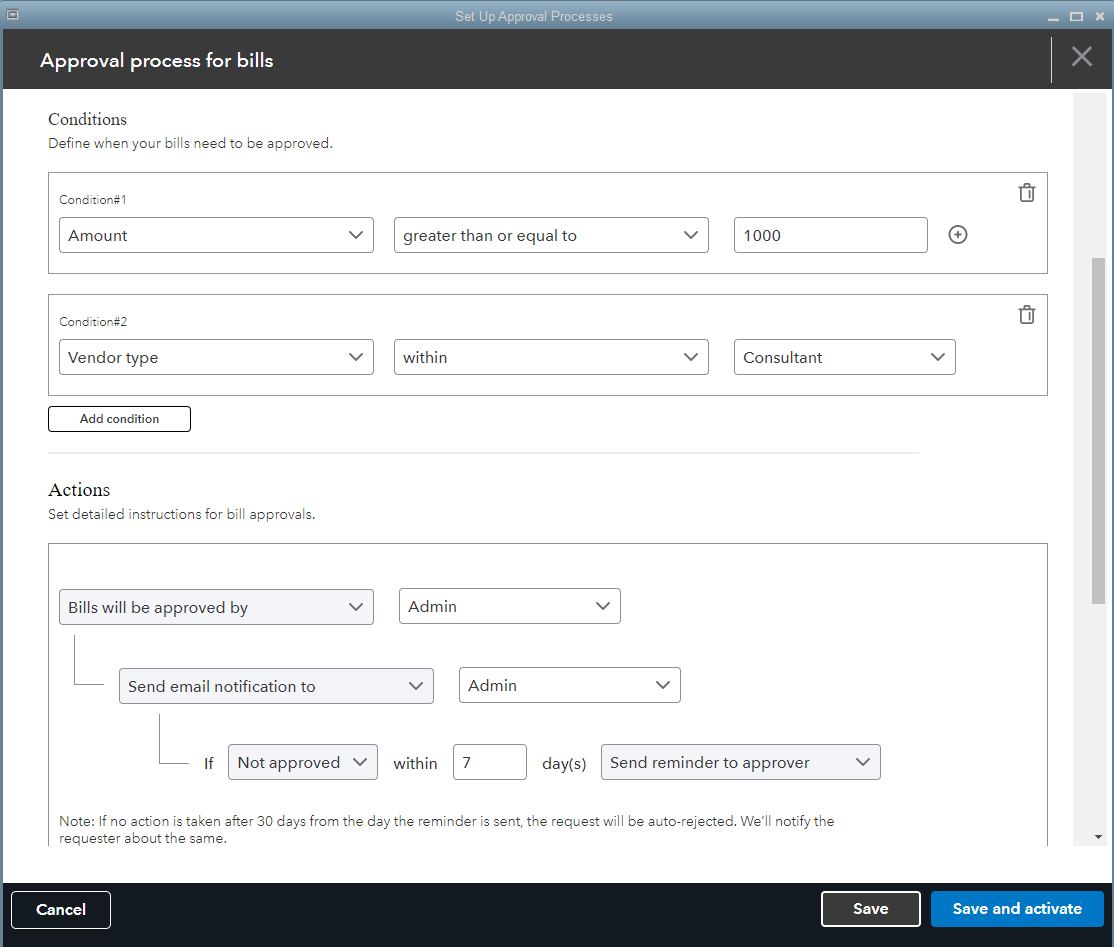
Setting up a new workflow approval process for bills
Invoicing with QuickBooks Enterprise is similar to other QuickBooks products—you can create and customize invoices and send them out as PDFs or emails. However, Enterprise takes it one step further by allowing you to create and send invoices in batches—as opposed to entering information for each individual invoice manually.
Batch invoicing allows you to create invoices in bulk from a single-entry input, saving you time and effort. If you have multiple clients who are billed on a monthly basis for similar ongoing services, then you can create all of their invoices at once.
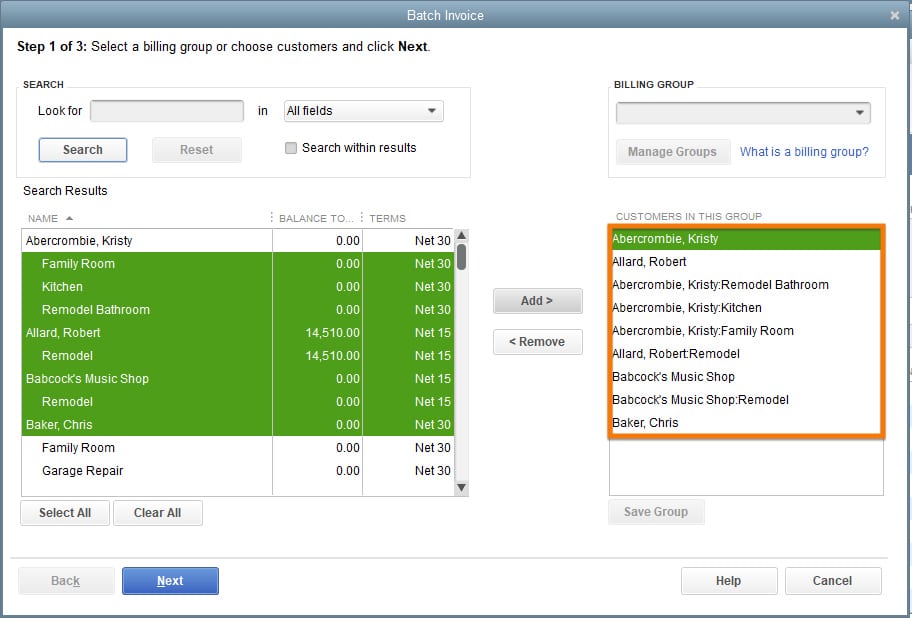
Batch invoicing feature in QuickBooks Desktop Enterprise
To reconcile your bank statements, you can choose to connect your bank account (bank feeds) or upload your files of statements manually, which gives you more flexibility. To make reconciliation faster, QuickBooks has a streamlined Undeposited Funds account that holds separate invoice payments and sales receipts you want to consolidate to match the single deposit in your bank statement. Some accounting programs also have an Undeposited Funds account, but they aren’t as comprehensive as that in QuickBooks Desktop.
QuickBooks Enterprise is ideal for project-based businesses like construction companies. You can create an estimate, and when that estimate is approved, you can convert it to an invoice instantly. You can also split estimates into as many invoices as needed (progress invoicing) instead of asking for a full upfront payment.
As you complete the service needed, you can simply add items from the original estimate to progress invoices. When creating a progress invoice out of an estimate, you need to specify how much you want to charge on the invoice for the selected items.
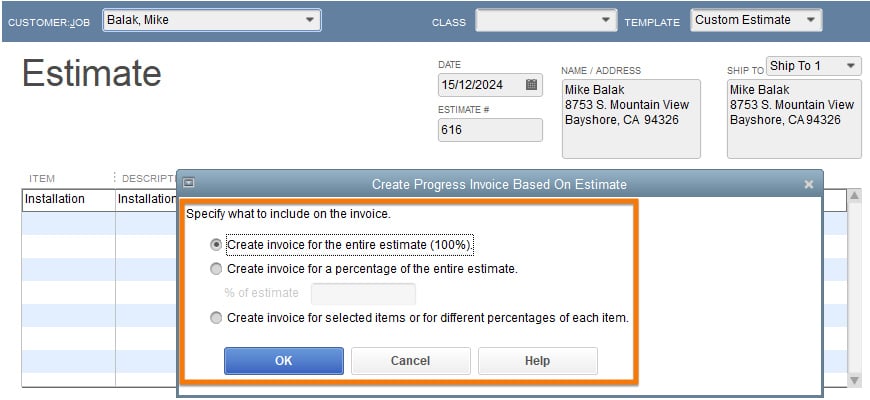
Progress invoicing in QuickBooks Desktop Enterprise
If changes are needed to the scheduled construction work, you can create change orders by editing the original estimate. QuickBooks will create a change order automatically based on the information you entered.
QuickBooks Enterprise isn’t the best tax management solution as it doesn’t help you file sales tax returns. However, if you only need help with tracking your taxes, then the platform can still provide a good value. You can determine how much you owe in taxes easily using the Sales Tax Liability Report. Sales taxes can be added to your invoice, and the program will apply the appropriate sales tax rate automatically based on the type of product or service, customer, and location you indicate in your sales form.
QuickBooks Enterprise has the strongest inventory management features of any accounting software we’ve reviewed. It has an Advanced Inventory module that provides enhanced features not found in the lower QuickBooks Desktop versions, including the ability to track inventory across locations.
Multi-inventory tracking in Enterprise lets you set specific reorder points, so you’ll be alerted when to replenish stocks, create assemblies using parts from different locations or warehouses, and transfer items between locations.
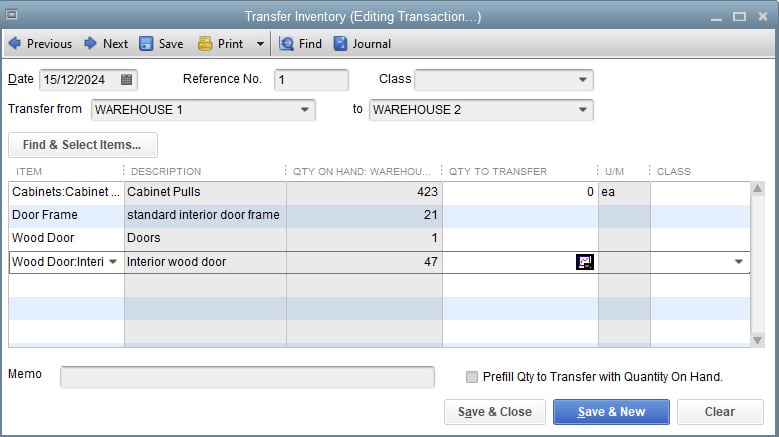
Transfer inventory between locations in QuickBooks Desktop Enterprise
You can use mobile barcode scanning to automate data entry, track inventory by bin numbers, and create customized inventory reports, such as inventory stock by item, inventory valuation summary, and assembly shortage by item. With Enterprise, you also have the option to choose between the first-in, first-out (FIFO) method and the average cost method to track inventory cost.
Another notable feature we want to emphasize is the ability to create pricing rules to adjust pricing automatically based on the rules you specify. For instance, you can set up a rule where your top 10 customers will receive a discount of 20% automatically if they purchase 10 items or more.
The platform allows you to run all the important reports you need to track your business performance, whether these are standard reports, such as profit and loss (P&L) statements, balance sheets, and cash flow statements, or customized reports like job costing, sales by customer reports, and purchases by vendor reports. The only reason it didn’t get a perfect mark is that it can track inventory by location but not income and expenses, which is something you can do in QuickBooks Online.
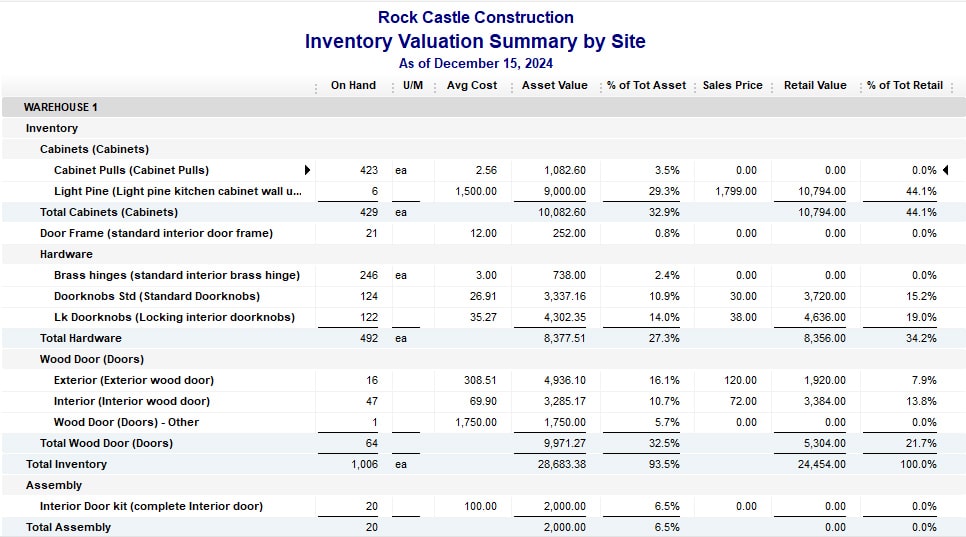
Sample report on inventory by location in QuickBooks Enterprise
Multicompany reporting
One of the best reporting features of Enterprise is the ability to generate consolidated financial statements across multiple company files. This is particularly useful for businesses that manage several entities or subsidiaries and need a consolidated view of their financial performance. The program syncs data from all connected company files so that the data in the reports is always up-to-date.
QuickBooks Enterprise is designed only to capture expense receipts and track business mileage. From your smartphone, you can snap a picture of your receipt and upload it to QuickBooks Desktop. The program will then record the information from the receipt automatically and match it with an existing transaction.
The mileage tracking feature lets you track your vehicle mileage automatically instead of manually recording odometer readings. Logged trips in QuickBooks Desktop are then available for approval by managers or supervisors. Once approved, you can bill them to the appropriate customer or process employee reimbursements.
However, there are several things you can’t do with Enterprise’s mobile app. You can’t send invoices and accept payments online, which is possible with similar software like QuickBooks Online and Xero.
Other Features
- Fixed asset management: With QuickBooks’ Fixed Asset Manager, you can record new fixed asset purchases and accurately track their depreciation. Additionally, it calculates the gain or loss from the sale of a fixed asset.
- Intercompany transactions: QuickBooks Enterprise allows you to consolidate financial reports that merge data from multiple companies.
- Automatic mileage tracking: This enables you to record your business trips automatically using the mobile app instead of calculating your odometer readings manually.
- Cash flow hub: This provides a single place to track all your incoming and outgoing cash flow.
We awarded QuickBooks Enterprise a perfect score because it provides sufficient integration options for essential business workflows, including payroll, time tracking, electronic bill payments, and online payment processing. Some of its most popular third-party integrations include Fishbowl inventory, Gusto, Microsoft 364, and Webgility. It also integrates with other QuickBooks products, including QuickBooks Time and QuickBooks Payroll.
QuickBooks Enterprise is generally easy to set up, but some users may find some of the steps intimidating. Also, it may require extra time to customize the software to fit your specific business needs. The good thing is that Enterprise provides a comprehensive installation guide with helpful wizards and prompts, enabling you to set up your company files and initial settings efficiently.
QuickBooks Desktop Pro or Premier users will find QuickBooks Enterprise familiar. However, if you’re transitioning from QuickBooks Online to Enterprise, expect a steep learning curve. The features can be overwhelming and difficult if you don’t have bookkeeping experience. This makes QuickBooks Enterprise ideal for businesses working with experienced bookkeepers.
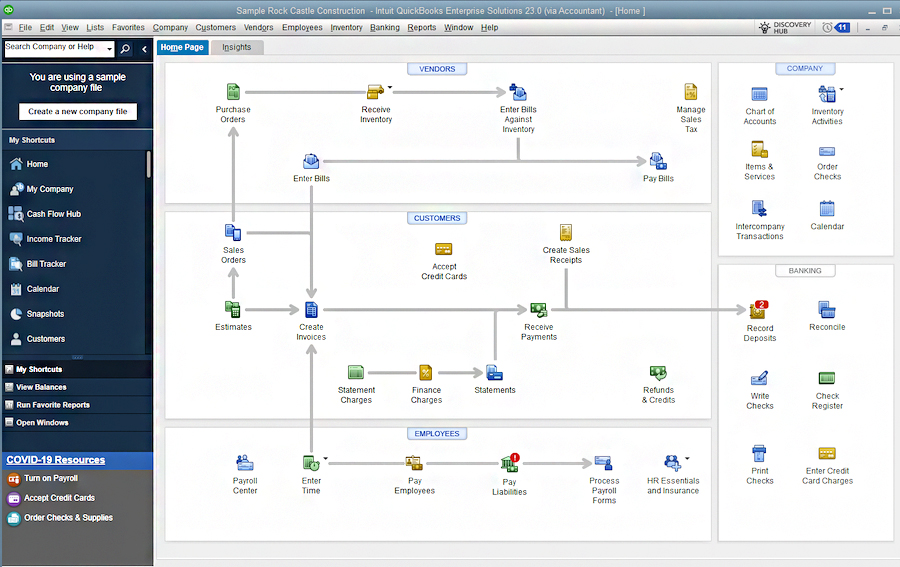
QuickBooks Desktop Enterprise homepage
QuickBooks Enterprise Gold, Platinum, and Diamond users get access to 24/7 unlimited customer support through QuickBooks Priority Circle. This is a free VIP customer support program that includes a dedicated account team, comprehensive product training, and 24/7 technical support. You can also ask for on-demand training as a QuickBooks Enterprise account user.
How We Evaluated QuickBooks Enterprise
We evaluated QuickBooks Enterprise using the scoring rubric below.
5% of Overall Score
In evaluating pricing, we considered the billing cycle (monthly or annual) and the number of users.
5% of Overall Score
This section focuses more on first-time setup and software settings. The platform must be quick and easy to set up for new users. Even after initial setup, the software must also let users modify information like company name, address, entity type, fiscal year-end, and other company information.
5% of Overall Score
The banking section of this case study focuses on cash management, bank reconciliation, and bank feed connections. The software must have bank integrations to automatically feed bank or card transactions. The bank reconciliation module must also let users reconcile accounts with or without bank feeds for optimal ease of use. Lastly, the software must generate useful reports related to cash.
5% of Overall Score
The A/P section focuses on vendor management, bill management, bill payments, and other payable-related transactions. A/P features include creating vendors and bills, recording purchase orders and converting them to bills, creating service items, and recording full or partial bill payments.
5% of Overall Score
This takes into account customer management, revenue recognition, invoice management, and collections. The software must have A/R features that make it easy for users to collect payments from customers, remind customers of upcoming or overdue invoices, and manage customer obligations through analytic dashboards or reports.
10% of Overall Score
Businesses with inventory items should choose accounting software that can track inventory costs, manage COGS, and monitor inventory units.
10% of Overall Score
Service or project-based businesses should choose accounting software that can track project costs, revenues, and profits. The software must have tools to track time, record billable hours or expenses, send invoices for progress billings, or monitor project progress and performance.
4% of Overall Score
In this section, we’re looking at sales tax features. The software must have features that allow users to set sales tax rates, apply them to invoices, and enable users to pay sales tax liability.
4% of Overall Score
Reports are important for managers, owners, and decision-makers. The software must have enough reports that can be generated with a few clicks. Moreover, we’d also like to see customization options to enable users to generate reports based on what they want to see.
10% of Overall Score
Customer service is evaluated based on the number of communication channels available, such as phone, live chat, and email. Software providers also receive points based on other resources available, such as self-help articles and user communities. Finally, they are awarded points based on the ease with which users will find assistance from independent bookkeepers with expertise in the platform.
10% of Overall Score
This requires the software to allow users transitioning from other bookkeeping software to import their chart of accounts (COA), vendors, customers, service items, and inventory items. Ideally, there will be a wizard to walk the user through the import process.
10% of Overall Score
Ease of use includes the layout of the dashboard and whether new transactions can be initiated from the dashboard rather than having to navigate to a particular module. Other factors considered are user reviews specific to ease of use and a subjective evaluation by our experts of both the UI and general ease of use.
5% of Overall Score
This includes the availability of integrations for payroll, time tracking, and receiving e-payments. We also evaluated whether an electronic bill pay integration was available.
5% of Overall Score
The software must have a mobile app to enable users to perform accounting tasks even when away from their laptops or desktops. Some of the features we looked into include the ability to create and send invoices, accept online payments, enter and track bills, and view reports on the go.
7% of Overall Score
We went to user review websites to read first-hand reviews from actual software users. This user review score helps us give more credit to software products that deliver a consistent service to their customers.
Frequently Asked Questions (FAQs)
You should find Enterprise easy to use—if you’re familiar with Pro or Premier. However, if you’re used to a cloud-based program like QuickBooks Online, expect a steep learning curve.
No, they’re two completely different programs. QuickBooks Enterprise is a QuickBooks Desktop product, while QuickBooks Online is a cloud-based accounting software.
Yes, you can take your files online through cloud hosting (for an additional fee). Hosted QuickBooks Enterprise allows you to access all of its features from a cloud server, giving you online access to your accounting files.
No, it’s a bit expensive for very small businesses. If you need a scaled-down and more affordable solution, we recommend you check our evaluation of the best small business accounting software.
QuickBooks Enterprise is great for midsize and large businesses dealing with complex inventory management and those that need more flexibility in their pricing structure.
Bottom Line
QuickBooks Enterprise doesn’t skimp on features, and most of them are labeled “Advanced” for good reason. If you need reliable tools for managing complex inventory, pricing, and financial reports, QuickBooks Enterprise won’t fail you. However, it may not be the best fit for your business if you have minimal inventory or are on a budget.
